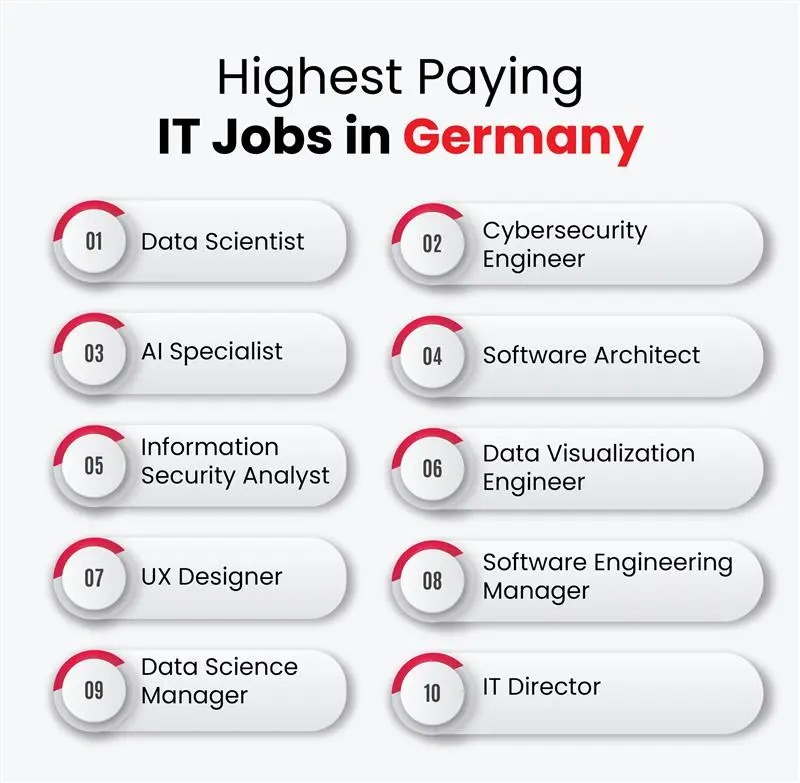Are you someone who is looking for IT jobs in Germany but unsure where to start?
But don’t worry! You’re here now, and we can begin by analyzing the current trends in Germany.
Germany offers a progressive and welcoming environment for IT professionals, including international talent. Above all, with a strong demand for skilled workers and competitive salaries, the country’s tech sector continues to be a key economic driver. According to reports, the Information Technology and Communications (ITC) market in Germany is expected to grow by 6% between 2021 and 2026, underscoring its ongoing innovation and expansion.
Table Of Content
1Is Germany good for IT Jobs?2Highest Paying IT Jobs in Germany3IT Job Opportunities in Germany4The Bottom Line6Frequently Asked Questions
Is Germany good for IT Jobs?
Yes! Germany is good for IT jobs, especially for international professionals. This is because, with a booming tech industry, strong demand for skilled workers, competitive salaries, and a high quality of life, IT jobs in Germany offer a compelling package for anyone in this field.
Massive Talent Demand
To begin with, over 149,000 IT positions were vacant in 2023, marking a 50% increase from the previous year. This clearly reflects a rapidly growing demand for skilled professionals.
Strong Salaries
Moreover, the average IT salary in Germany is around €65,421, which is nearly 33% higher than the national average—making it a highly rewarding destination for tech experts.
Work-Life Balance
In addition, professionals enjoy 30 vacation days per year, a no after-hours work culture, and well-defined boundaries between personal and professional life.
Visa & Immigration Friendly
Germany also makes immigration easier for global talent. For instance, the EU Blue Card and the newly introduced Opportunity Card (2024) simplify the process for non-EU IT professionals.
English-Speaking Jobs Available
Besides, many tech roles—especially in startups and international firms—are conducted entirely in English, making the transition smoother for expats.
Growth & Innovation
Finally, the IT & Communications (ITC) market is projected to grow by 6% between 2021 and 2026, fueled by Germany’s strong push for digitalization and innovation.
Highest Paying IT Jobs in Germany
Germany offers excellent opportunities for IT professionals, with competitive salaries across a wide range of roles.
Here is the list of highest paying IT jobs in Germany:
1. Data Scientist
2. Cybersecurity Engineer
3. AI Specialist
4. Software Architect
5. Information Security Analyst
6. Data Visualization Engineer
7. UX Designer
8. Software Engineering Manager
9. Data Science Manager
10. IT Director
1. Data Scientist
Data Scientists play an important role in today’s data-driven world. They collect, clean, and analyze large datasets to uncover actionable insights that directly support business decisions. By using advanced statistical methods, machine learning, and IT tools, they build predictive models and identify patterns that drive innovation across industries.
With Germany’s increasing focus on digitalization, Data Scientists are among the most in-demand and well-compensated tech professionals.
Data Scientist Salary in Germany
Freshers: €48,000/yr approx.
Mid-Career: €65,000/yr approx.
Experienced: €85,000/yr approx.
2. Cybersecurity Engineer / Specialist
In today’s digital landscape, Cybersecurity Engineers and IT Security Specialists are essential for protecting sensitive data and maintaining organizational security. They design and implement cyber defense strategies, monitor threats, and safeguard systems from increasingly sophisticated attacks.
Furthermore, these professionals need a thorough understanding of security architecture, threat intelligence, and risk management. As cyber risks continue to evolve, their expertise is more critical than ever across Germany’s industries.
Cybersecurity Engineer Salary in Germany
Freshers: €55,000/yr approx.
Mid-Career: €80,000/yr approx.
Experienced: €110,000/yr approx.
3. Artificial Intelligence (AI) Specialist
With Germany accelerating its digital transformation, the demand for AI Specialists is rising rapidly. These professionals design intelligent systems and algorithms that power automation, smart technologies, and innovative solutions.
Importantly, AI Specialists should have solid skills in machine learning, deep learning, and deploying AI models in real-world applications.
AI Specialist Salary in Germany
Freshers: €50,000/yr approx.
Mid-Career: €75,000/yr approx.
Experienced: €100,000/yr approx.
4. Software Architect
Software Architects are responsible for planning, designing, and overseeing the development of complex software systems. Their work ensures technical solutions align perfectly with business objectives.
Notably, this role demands deep engineering expertise and familiarity with software design patterns and architectures. A master’s degree is often preferred or required for advanced positions.
Software Architect Salary in Germany
Freshers: €60,000/yr approx.
Mid-Career: €90,000/yr approx.
Experienced: €120,000/yr approx.
5. Information Security Analyst
As cyber threats become more frequent and advanced, Information Security Analysts have a critical job in monitoring and defending organizational systems.
They analyze vulnerabilities, implement robust security measures, and respond to incidents to protect sensitive information. Consequently, their responsibilities are becoming increasingly vital across all sectors.
Information Security Analyst Salary in Germany
Freshers: €50,000/yr approx.
Mid-Career: €75,000/yr approx.
Experienced: €90,000/yr approx.
6. Data Visualization Engineer
Data Visualization Engineers transform complex datasets into clear, interactive visuals, enabling stakeholders to make informed, data-driven decisions.
In addition, their skills in data storytelling, dashboards, and visualization tools make them invaluable assets to organizations that rely on data insights.
Data Visualization Engineer Salary in Germany
Freshers: €45,000/yr approx.
Mid-Career: €65,000/yr approx.
Experienced: €85,000/yr approx.
7. UX Designer
UX Designers focus on creating intuitive, user-friendly interfaces that enhance user satisfaction. Their goal is to strike the perfect balance between aesthetics and functionality.
Moreover, by applying user research, design thinking, and prototyping, they ensure that products meet user expectations and deliver a seamless experience.
UX Designer Salary in Germany
Freshers: €40,000/yr approx.
Mid-Career: €60,000/yr approx.
Experienced: €80,000/yr approx.
8. Software Engineering Manager
Software Engineering Managers lead and inspire development teams, combining deep technical knowledge with strong leadership skills.
They are responsible for guiding team members, ensuring code quality, managing project timelines, and aligning technical execution with strategic business goals.
Software Engineering Manager Salary in Germany
Freshers: €65,000/yr approx.
Mid-Career: €100,000/yr approx.
Experienced: €130,000/yr approx.
9. Data Science Manager
Data Science Managers bridge technical expertise with strategic leadership, overseeing analytics, machine learning projects, and data-driven initiatives.
As a result, they play a vital role in shaping data strategies that fuel business growth and innovation.
Data Science Manager Salary in Germany
Freshers: €70,000/yr approx.
Mid-Career: €110,000/yr approx.
Experienced: €135,000/yr approx.
10. IT Director
IT Directors are responsible for managing entire IT departments and setting technology strategies that align with organizational objectives.
They oversee budgets, lead large teams, and ensure secure, efficient, and scalable IT operations. Therefore, exceptional project management and communication skills are essential for success in this role.
IT Director Salary in Germany
Freshers: €80,000/yr approx.
Mid-Career: €120,000/yr approx.
Experienced: €150,000+/yr approx.
The Factors that Influence Salaries of IT jobs in Germany is:
Education & Qualifications: Higher degrees and certifications can significantly boost pay.
Skills & Experience: Expertise in AI, cloud computing, and cybersecurity often commands premium rates.
Company Size: Larger firms generally offer better pay and benefits compared to smaller companies.
Negotiation Skills: Salary discussions are common in Germany, so be prepared to negotiate.
Language: German proficiency isn’t always required but can greatly enhance local job opportunities.
IT Job Opportunities in Germany
Reports indicate that approximately 124,000 to 149,000 vacant IT positions existed in 2023, marking a 50% increase from the previous year.
This surge is primarily driven by the country’s strong economy and national digitalization trend. Clearly, the IT industry is among the top in Demand Jobs in Germany, generating substantial revenue and showing projected growth.
Entry-Level IT Jobs
For those starting out, Germany is friendly to newcomers in the tech industry. Some of the most common entry-level in-demand jobs in Germany include:
- Junior Software Developer
- Junior Data Analyst
- IT Support Specialist
- Junior Web Developer
Typically, requirements for entry-level IT jobs in Germany include a degree in computer science or an equivalent qualification, or alternatively, relevant practical experience.
Visa & Germany Immigration Opportunities
Interestingly, even without a degree, you can still qualify for a visa under certain conditions. Here’s a quick breakdown:
- Without a Degree: If you have 3+ years of IT experience and a valid job offer, you can secure a visa.
- Blue Card: Now open to experienced professionals even without a formal degree.
- Opportunity Card: Launched in June 2024, this card allows a 1-year stay to find work.
- Employment Contract Visa: Granted based on a valid job contract.
- Freelancer/Self-Employment Visa: Specifically for freelance tech professionals and entrepreneurs.
Job Search Strategies
When it comes to finding a job, using the right approach is key. Consider the following strategies:
- Platforms: LinkedIn, Xing, Glassdoor, Monster, StepStone, Berlin Startup Jobs
- Freelance Work: Platforms such as Upwork, Freelancer.com, and Fiverr
- Networking: Attend job fairs, tech meetups, conferences, and leverage personal referrals
- Direct Applications: Apply directly through company websites
- Resume Tailoring: In particular, customize your CVs to match job descriptions
- Language: Knowing German significantly increases your chances
Salary Insights
The average salary for IT jobs in Germany is €65,421—which is 32.8% above the national average. Moreover, salaries are particularly attractive in cities like Berlin, Munich, and Frankfurt.
The Best Cities for Highest Paying Jobs in Germany is given by:
| City | Average Salary (€/year approx.) | Key Industries |
|---|---|---|
| Munich | €68,568 | Tech, research, automotive |
| Cologne | €66,465 | E-commerce, digital marketing |
| Hamburg | €60,797 | Media, gaming |
| Frankfurt | €55,945 | Finance, consulting |
| Stuttgart | €55,820 | Engineering, automotive |
| Berlin | €54,274 | Startups, tech |
| Düsseldorf | €53,596 | Telecom, logistics |
| Nuremberg | €53,500 | Software, automation |
| Dortmund | €50,000 | Manufacturing, digital infrastructure |
Work-Life Balance and Cultural Insights for Expats in Germany
Germany is well-known for maintaining a healthy separation between work and personal life. Here’s what you can expect:
Working Hours: Typical workdays are 9:00 AM–6:00 PM with a 1-hour lunch break, though exact schedules may vary by company.
After-Hours Communication: There’s no expectation to answer work emails or messages outside office hours, protecting your personal time.
Paid Vacation: Employees receive 30 days of paid leave plus 10 public holidays annually.
Sick Leave: Paid sick leave is available, usually requiring a doctor’s note if you’re off for more than three days.
Parental Support: Flexible parental leave is offered, including time off when children are sick, reflecting Germany’s family-friendly policies.
The Bottom Line
Germany stands out as one of the most promising destinations for IT professionals, especially for international talent. With a booming tech industry, skill shortages across sectors, attractive salaries, and a high standard of living, the country is actively welcoming qualified professionals from abroad. In the same way, from the availability of English-speaking jobs and flexible visa pathways like the EU Blue Card and Opportunity Card to a strong emphasis on work-life balance, IT jobs in Germany offer more than just a paycheck, it offers long-term career growth and personal well-being.
At CanApprove, we’re proud to share that Ms. Safna, a talented Software Developer from Kochi Infopark, has successfully moved to Germany through the Germany Opportunity Card program, all thanks to our expert guidance and support.
In fact now is the perfect time to explore your chances in Germany immigration. Thus, if you’re planning to move to Germany and work in the IT industry. Then start preparing your resume, upskill in trending technologies, and apply through the right channels.






